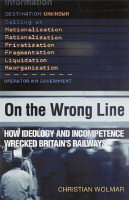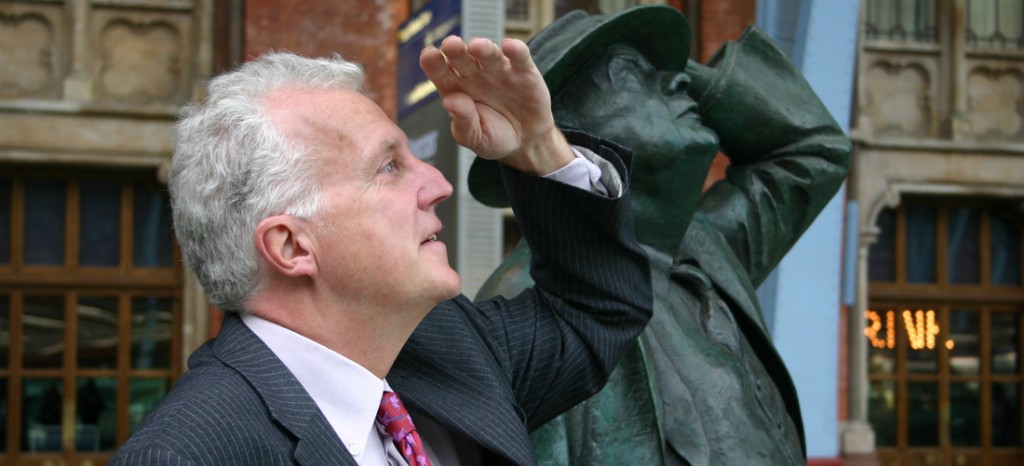On the Wrong Line Review
 They had a dream. They watched in a haze of nostalgia as old ladies cycle home from evensong. They could hear the sound of willow on leather. And they could see the words Great Western printed on the side of steam engines thundering into elderly stations. They saw a golden era of the railways when private companies served filet mignon to the toffs while the cap-doffing nicotine-stained lower orders filed gratefully into third class carriages.
They had a dream. They watched in a haze of nostalgia as old ladies cycle home from evensong. They could hear the sound of willow on leather. And they could see the words Great Western printed on the side of steam engines thundering into elderly stations. They saw a golden era of the railways when private companies served filet mignon to the toffs while the cap-doffing nicotine-stained lower orders filed gratefully into third class carriages.
Unfortunately for the rest of us, the people with this fevered hallucination were Government ministers with platoons of highly-educated senior civil servants at the disposal, willing to make their masters’ vision something more substantial. In some cases, the senior officials were positively eager.
The privatisation of the railways was a case of half-baked ministerial ideology translated being translated into terrible reality by civil servants who combined extreme cleverness with breathtaking stupidity. It was a story of hubris, arrogance, incompetence and plain misjudgement.
So apart from John Major and his Tory Cabinet of silly billies, who else was responsible for the way in which it was sold off?
Of course, it is unfair to point an accusatory finger at one civil servant. After all they are employed to prosecute the ideas of whatever political party had been elected to power. In this case, however, a single public servant seems to have carried out rail privatisation with particular zeal. That man, according to Christian Wolmar’s excellent new book On the Wrong Line, was Steve Robson (now Sir Steve), the head of the Treasury’s privatisation unit. Not only was he one of the principal architects of the rail sell-off, he went on to design the dysfunctional public private partnership at London Underground. In the case of the rail network, the whole shooting match was stuck into the private sector. But on the Tube system, the operation of the trains was kept in public hands. Have we missed something here?
And if the militant privateers thought so much of the private sector, how come Sir Steve didn’t suggest to the Chancellor of the Exchequer that he privatise great lumps of the Treasury? Perhaps companies could compete to implement each daft policy proposal? If the public sector is so inefficient, why did Sir Steve spend so much of his career in it? But I digress.
Wolmar’s book will warm the hearts of those – and there are many millions of us – who think that rail privatisation was wrong. It provides powerful ammunition to fire at those who cling to the absurdity that it has worked. It shows us how the fragmentation of the industry has cost taxpayers hundreds of millions of pounds and more tragically how it made a key contribution to the disasters at Southall, Ladbroke Grove, Hatfield and Potters Bar.
It reveals in detail how the preposterous infrastructure company, Railtrack, presided or, rather, failed to preside over the anarchic rail maintenance companies. We see how the contractual relationships resulted in a regime where some essential maintenance was left undone, some was botched and other projects were gold plated, and hugely expensive.
There’s nothing quite like having your blind prejudice reinforced by someone who had done the work. And Wolmar’s book is a tour de force.
It provides little succour for those of us with an attachment to the Labour Party. Not only has the present Government struggled to keep the ramshackle structure in the private sector, it has played down its role in attempting to get some kind of ministerial grip on it.
Even where the Government has effectively renationalised a major part of the industry, as in the case of Network Rail, it has continued to pretend that it is a private company. Anyone who believes that is either a government minister or shouldn’t be allowed out on their own.
Paradoxically, the Government is now exercising more power on the industry than it ever did. Transport Secretary Alistair Darling has abolished the semi-independent Strategic Rail Authority and brought all its powers in house at the newly created Department for Transport Rail Group.
One of the operators, South Eastern Trains, is actually being run by the state after the French owned group Connex was found to be more profligate and more incompetent than any other train operator. Ministers are about to reprivatise the franchise despite the fact that services have improved out of all recognition.
So let’s get this straight. The Government has brought part of the network under state control but is pretending it isn’t – and is boasting about placing another part of it back in the private sector where it is likely to receive large state subsidies.
Wolmar’s conclusion is that there is no coherent strategy and that eventually there will be another major restructuring exercise where the organisation which controls the track will also operate the vehicle that run on it.
The author believes that the only sensible option is a ‘publicly-accountable and publicly owned railway’. The sad irony is that there were the words uttered by Tony Blair when he was leader of the opposition.
Wolmar’s polemics on the privatisation of the national rail network contrast with a loving portrayal of the London Underground in his Subterranean Railway now out in paperback. It is a tale vividly told of the buccaneering Victorian entrepreneurs who established the system and the impoverished men who dug the tunnels. Characteristically, however, Wolmar cannot resist a sideswipe at the Byzantine public private partnership arrangement now running the Tube. It is, as he puts it, ‘an experiment being tested out on London Underground’s passengers for the next 30 years’.
